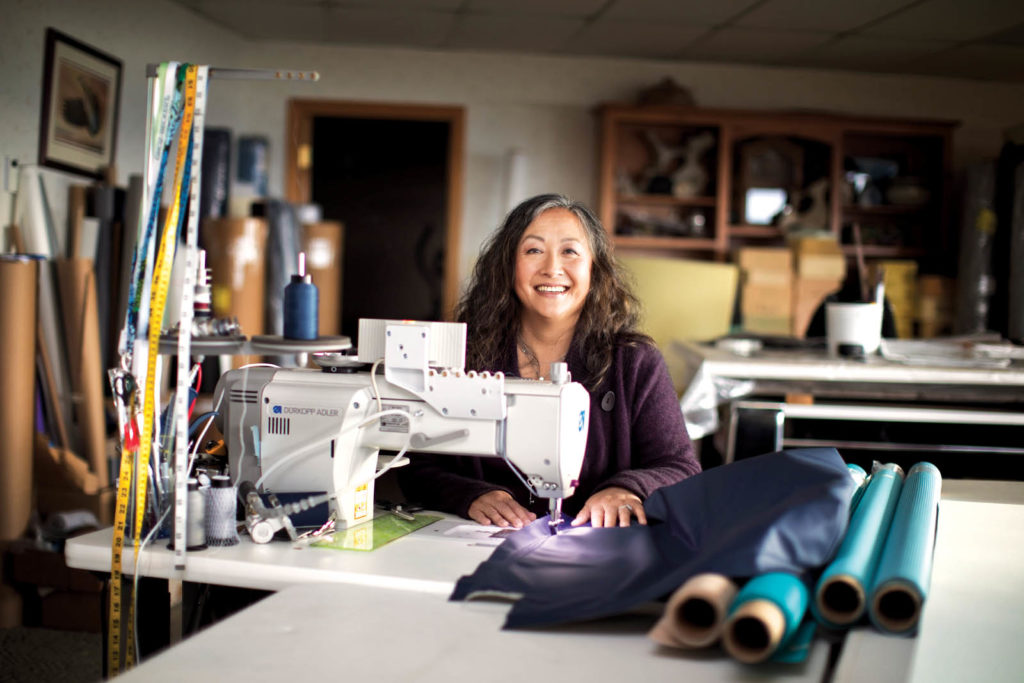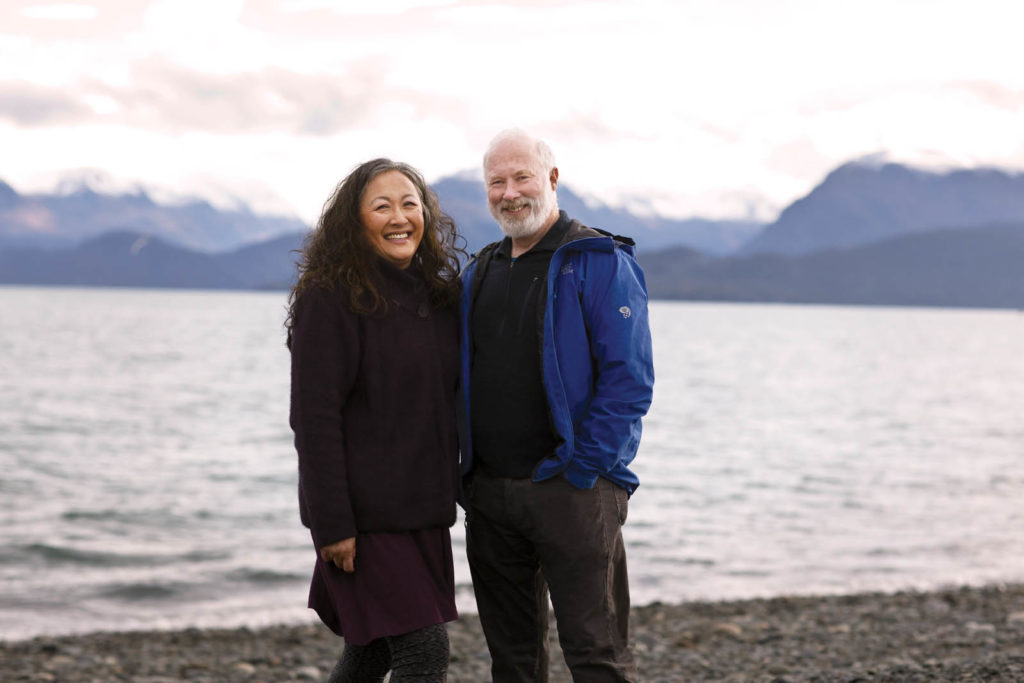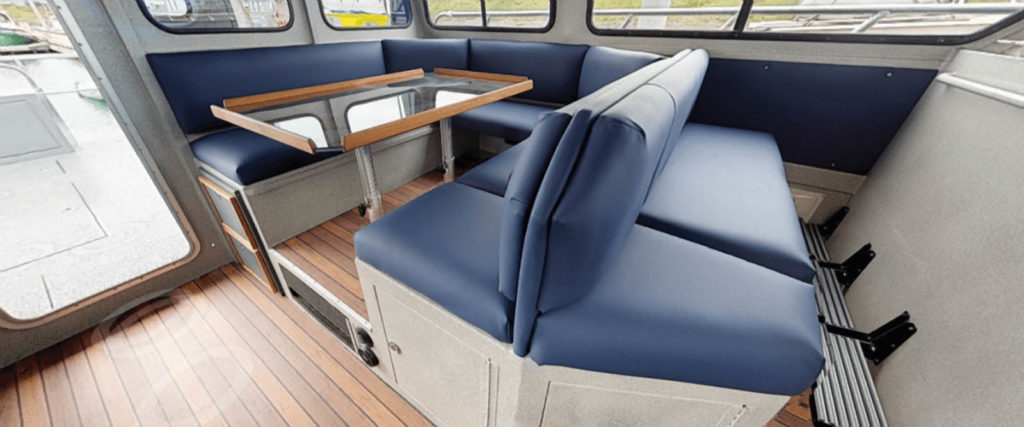
Photography by Megan Lyon Photography
Southcentral Alaska is filled with spectacular natural beauty, hardworking people and an array of fishing boats and other vessels that are often in need of repair. The latter fact creates an opportunity for Monica and Mike Stockburger, owners of the marine fabricator business Salty Cushions in Homer, the “Halibut Fishing Capital of the World” on the scenic Kachemak Bay 200 miles south of Anchorage.
“I’ve seen a lot of bad boat repairs and repaired a lot of bad canvas,” says Monica Stockburger. “I analyze what caused the item to fail. When I fix it, I challenge myself, ‘Is that the best repair I can make?’”
Stockburger isn’t just concerned with durability. “I also want to make the cushions more comfortable and attractive,” she says. “Every boat is unique, so I design solutions that fit the specific boat, just like you tailor garments to fit a specific body.”
Salty Cushions specializes in interior and exterior cushions, biminis, bimini frames and other fabrication services for larger boats, especially ones longer than 30 feet. “People tend to spend more time on these larger boats, so they need better living and sleeping conditions,” says Stockburger, who notes that these vessels are typically commercial fishing boats or charter boats for fishing or whale watching. Commercial fishing crews often spend months at a time on a boat, which can be especially tough on the cushions because of the close quarters and daily use.
“We’re not going to make something that will just get you through one season,” Stockburger says. “We’re going to provide solutions that help you and others enjoy your boat more and motivate you to spend more time there.”
Resourceful beginnings
This practical approach guides Stockburger, who was born in Brazil and immigrated to the United States with her parents when she was young.
“We couldn’t afford a lot of things when I was growing up, but we were a resourceful family,” says Stockburger, who was raised in Los Angeles, Calif. She enjoyed outdoor watersports, from swimming to canoeing. She also learned to sew at age seven and steadily built her skills, sewing clothing, purses, furniture covers and even wedding dresses.
After completing her studies at the University of California−Los Angeles (UCLA) and earning a teaching certificate, Stockburger had three job offers, including one in a Native village in western Alaska. “I wanted to go somewhere where I could spend time outdoors,” says Stockburger, who moved to Alaska in 1991.
In addition to teaching, Stockburger started a sewing business on the side, fixing insulated jackets and repairing zippers. In her free time, she learned how to make traditional Alaskan animal skin and fur creations accented with beads and quills. “I discovered that sewing isn’t just a practical skill; it’s a functional art form.”

Back to school
After retiring from a 25-year teaching career, Stockburger craved a new challenge. Within three months of her retirement, she began building Salty Cushions.
Part of this interest in the marine fabrication business was inspired by her husband, Mike, who operated the full-service Homer Boat Yard. As Stockburger worked with him and repaired boat covers, a question kept puzzling her.
“The upholstery on a boat always fails,” she says. “But there are cars that have been on the road for decades that don’t have upholstery failures. I started wondering if automotive upholstery techniques could be applied to marine cushions for greater durability and comfort.”
Looking for answers, Stockburger enrolled at Tarrant County College (TCC) in Texas, which offers an upholstery program, including an auto and boat upholstery course.
“My instructor would bring a variety of upholstered items to class. Then we’d take them apart and talk about the best ways to fix them,” says Stockburger, who took all the upholstery classes available at TCC and spent a lot of time working in the shop.
Stockburger and her husband continue to apply this knowledge daily at Salty Cushions. Word-of-mouth advertising and Salty Cushions’ Facebook page have helped the business thrive. “It’s just the two of us, so we’re really selective about the clients we serve,” says Stockburger, a former BERNINA Club sewing instructor. “Our greatest business strength is our collective knowledge.”
Seeking connections
The Stockburgers derive knowledge from a variety of sources, including trusted mentors Dave Elliott, MFC, owner of David’s Custom Trimmers in Wakerley, Queensland, Australia; Deb and Mark Hood, MFC, owners of Hood Canvas LLC in Merrimac, Mass.; and Steve Szenay, technical support manager with Serge Ferrari North America in Deerfield Beach, Fla.
“While a lot of fabricators stick with the tried and true, my mentors encourage me to try new things,” Stockburger says.
One example is silicone leather, which Stockburger learned about at IFAI Expo 2018. This hospital-grade vinyl is nonporous, has no off-gassing and is easy to clean. And while it isn’t inexpensive, it is a safe product, especially for people with breathing issues or allergies. “This fabric looks and feels great,” Stockburger says. “It doesn’t get hot when you sit on it. You could sleep directly on silicone leather, and it’s still comfortable.”
Using the right needles is just as important as selecting the right fabric, and for Stockburger, IFAI Expo has been a good place to connect with vendors such as needle supplier Groz-Beckert. “Now I have a specific contact I can call when I have questions,” she says. “They even called me a few times during the COVID-19 lockdown to see how we were doing.”
Stockburger also values her relationship with Sam Sloan, owner of Sloan Machinery Co. in Salem, N.H. “Sam is a tremendous resource for the entire industry,” she says. “He puts a lot of effort into providing the best machine for the intended use. He also provides the support you need, including finding appropriate feet, attachments, sewing machine maintenance workshops and parts.”
Connecting with similar business owners and craftspeople around the world has helped Salty Cushions thrive. “While Homer is a small town, more people have been moving here or retiring here in the last 10 years,” Stockburger says. “The amount of money people are willing to spend
on boats is strong, so that’s also good.”
Stockburger says her customers appreciate knowing how investing a little more time and money in a project will get them a better product—one they will actually want to use, she says. No decision is taken lightly, as the Stockburgers consider each boat’s character and design.
“We enjoy solving problems,” she says. “We also take an artistic approach to our projects and marry this with durable materials. All this gives clients the peace of mind that leads to more enjoyable, carefree moments on the water.”
Darcy Maulsby is Iowa’s Storyteller and a fifth-generation Iowa farmer. She helps businesses discover and share their “wow” stories to help inspire their team members and clients to dream bigger, become better versions of themselves, and change the world for the good. Visit her online at www.darcymaulsby.com.
SIDEBAR: Q&A
What advice do you have for people who are interested in pursuing marine fabrication as a career?
Learn by doing. If you’re interested in marine fabrics, start with the basics by re-covering a boat cushion. Realize that you must invest a significant amount of time to master a skill. Keep an open mind as you keep learning. See what works and what doesn’t work as you study your work and others’ work. Also, find one or two mentors who are willing to visit with you and teach you more about the business. They can be a lifeline as they help answer your questions, challenge you to dig deeper and do even better work.
SIDEBAR: Project Snapshot

Transforming the Lightning
One of Salty Cushions’ unique projects involves the M/V Lightning. It was originally built by Maxweld Boats as a research vessel and was refurbished in 2019 by Bay Weld Boats of Homer, Alaska. Now a 44-foot catamaran, it has a U.S. Coast Guard certificate of inspection for 18 passengers and a crew of two.
Salty Cushions of Homer transformed a seating area from two benches into a wraparound settee. The client also wanted custom-built cushions for below-deck bunks, along with fabric panels. Monica Stockburger, Salty Cushions’ co-owner, knew this boat needed high-quality fabric that could withstand years of use. She selected Serge Ferrari Stamskin One for its durability and stain resistance, and because its rich color perfectly complemented the exterior paint and design elements of the vessel.
After the catamaran was overhauled, it was leased to a European millionaire as a tender to the client’s mega yacht for the duration of his stay in southeast Alaska.
“We thought it would be a once-and-done project,” Stockburger says. “This client is now talking about getting a second boat, and they want to work with Salty Cushions again. It’s exciting to help deliver an amazing final product.”
 TEXTILES.ORG
TEXTILES.ORG


